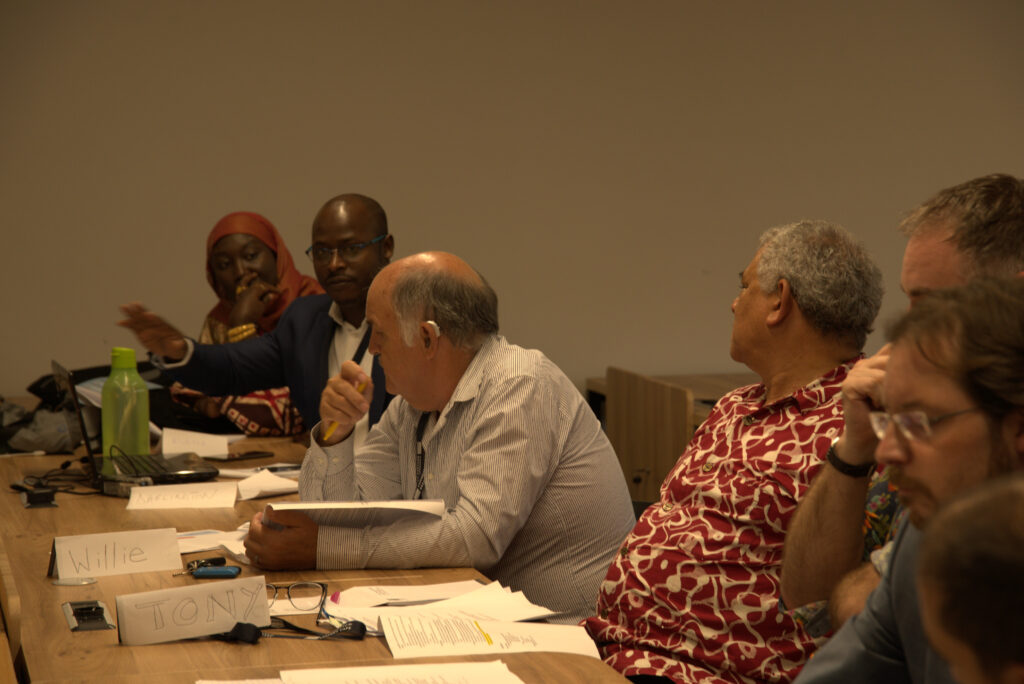Localization and Climate Adaptation: Different and Urgent Processes

Caption: Participants at the 2020 “Cities Facing Escalating Water Shortages” conference in Cape Town, hosted at the University of the Western Cape. The conference facilitated six teams to prioritize intervention areas related to water in the city. Teams covered natural sciences, the social sciences, politics and governance, economics, the technical sciences, and civil society. The outcomes of the conference shaped and continues to shape W12+ programs to this day.
The COVID-19 pandemic forced a transition to localization, or locally-led development, in the sustainable development community. COVID-19 upended traditional ways of doing business internationally – i.e. flying in foreign, often white westerners as ‘experts’ to solve contextually specific problems; it forced a very necessary, albeit at times slow-moving, shift to recognize, depend-on, and adhere-to local expertise and local knowledge.
In a recent webinar on “Localization and locally led development: An opportunity for thinking and working politically”, Anna Mosley, the learning lead for Oxfam’s Aotearoa’s Kōtui Programme talked about the reality of a decentralization and localization process – the key takeaways we heard were: (1) it takes time and (2) you will lose supporters, but gain much more in the long term.
In the same webinar, Joanne Choe, the Head of Program Quality and Gender at Cardno International Development, aptly talked about a ‘spectrum of localization’ and how we can’t get stuck thinking about systemic issues – we need to get something done. The recent ODI “Are we there yet” report on localization provides six key messages:
- Power shapes the journey towards localization;
- Power also shapes the destination (locally led practice);
- Resource transfers to Global South actors remain extremely low;
- Agency and ways of being are neglected;
- Good models for localization already exist, including those originating from the Global South;
- There is a dearth of data and evidence especially in measuring localization progress.
With one part of us strongly endorsing this transition to locally-led development – a process that EcoCiv works on every day through its programmatic work in water security, agrifood systems, conservation economies, and wellbeing economies – the other part of us stays awake at night thinking about the pressing issues of climate change – primarily on the adaptation side – as we know the near-term effects will be felt (and already are being felt) primarily in the Global South. How can we reconcile this transition to localization with the one resource we don’t have – time?
The science is clear from AR6, the sixth Assessment Report from the IPCC:
- Approximately 3.3-3.6 billion people live in contexts that are highly vulnerable to climate change
- Roughly half of the world’s population currently experience severe water scarcity for at least some part of the year due to climatic and non-climatic drivers
- Flood and drought related acute food insecurity and malnutrition have increased in Africa and Central and South America
- There is widespread deterioration of ecosystem structure and function, resilience and natural adaptive capacity
- Climate change has adversely affected both the mental and physical health of people globally
- In all regions, extreme heat events have resulted in human mortality and morbidity
- Food-borne and water-borne disease has increased
The list goes on.
This blog series will explore the intersection between localization and climate resilient development – the core question being: how can we reconcile adhering to a localization process that takes time with the knowledge that adaptation efforts must be made now to save lives, build resilient futures, and limit the worst effects of climate change?
Is there a process for localization that incorporates the expediency needed to manage this ticking time bomb of climate change? Or is expediency of action and localization an inherent juxtaposition?
COVID-19 has forced new processes and practices centering localization, presenting both challenges and opportunities. Evidence shows that community-led (as opposed to community-based) development is highly effective. In this series, we explore the successes and creative innovations as well as the persistent problems and challenges of localization of climate resilient development practice.
We don’t have all of the answers. Please engage with this blog series and send us questions to consider and case studies of examples (procedural, technical, etc.) that can be of use to the audience. Email information to eleaning@ecociv.org. This blog series will be updated monthly.
Written by Ellie Leaning and Larry Swatuk
